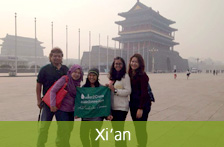
For women, jackets are tilted in the front with sleeves made up of five different kinds of cloth. Sometimes they slip on a sleeveless garment done in black, indicating formal attire. The Tu ethnic minority is renowned for their talent for singing and dancing. The Wutu dance, an ancient ritual dance to exorcise evil spirits, is still practiced in Nianduhu, a village in Tongren County of Qinghai Province. An extraordinary example of a once-vigorous culture, this dance illustrates the beliefs of the Wutu people and reflects their strong attachment to their own unique ways.

"Wutu" is another name for tiger in ancient Chinese. The Wutu dance is performed every winter by Tu people as a grand sacrificial ritual, aimed to rid the village of demons and bring good fortune. The Wutu dance of Tu minority is popular in Nianduhu Village, Tongren County, Qinghai Province. It is a unique folk custom and culture in that area and is celebrated from 5th to 20th Nov. of lunar calendar each year, including reciting Safety Sutras, joint entertainment between men and gods as well as warding off diseases and evil spirits. "Wutu" is also the name of the dancers. At the beginning of the ritual, the "Wutu" dancers would be painted with patterns of tigers and leopards on naked upper body, performing along the village and dancing in every household. The Wutu dance of Tu ethnic group can be traced back to centuries ago.

Wutu is a term in ancient Chinese, meaning "tiger". Local people in Regong Region, Tongren County of Qinghai Province, regard December 20 of the lunar calendar as a "dark day" when demons and ghosts would come out to make troubles. Therefore, they hold a sacrifice event - Wutu Dance, which is to imitate the tiger's movements to expel demons and ghosts and pray for peace.
The Wutu dance has its origin in primitive ritualistic dances in whichnature is worshipped. It is the ancient cultural connotation that arouses the interest of the scholars. What’s more, the Nadun Festival, also known as "July Meeting", is popular among the Tus.

It lasts nearly two months, from July the thirteenth to the early September and is said to be the longest lasting festival in the world. The festival was originally held in memory of a carpenter well known for his wit, but it has now become a carnival celebrating good harvests.















.jpg)










